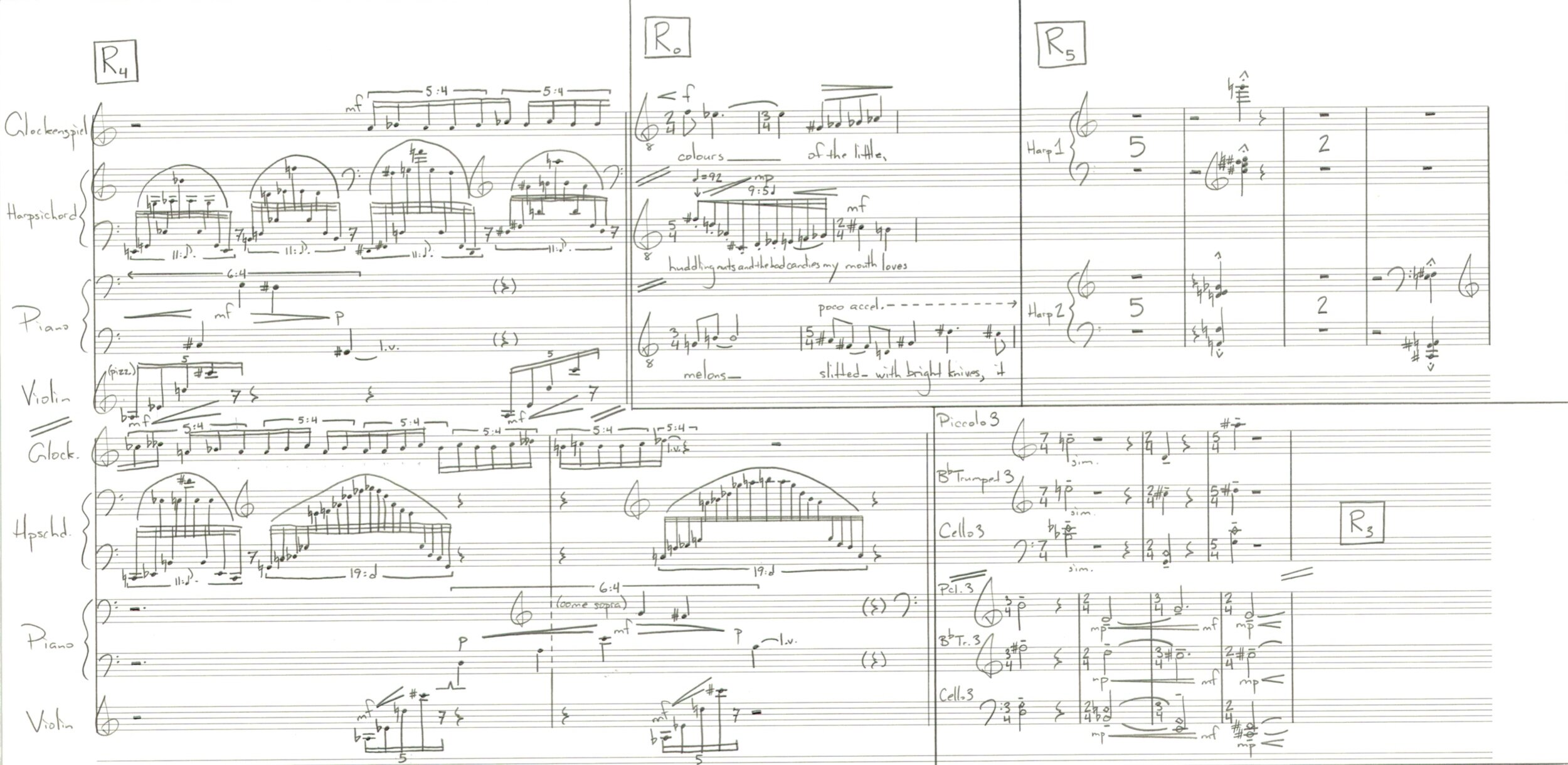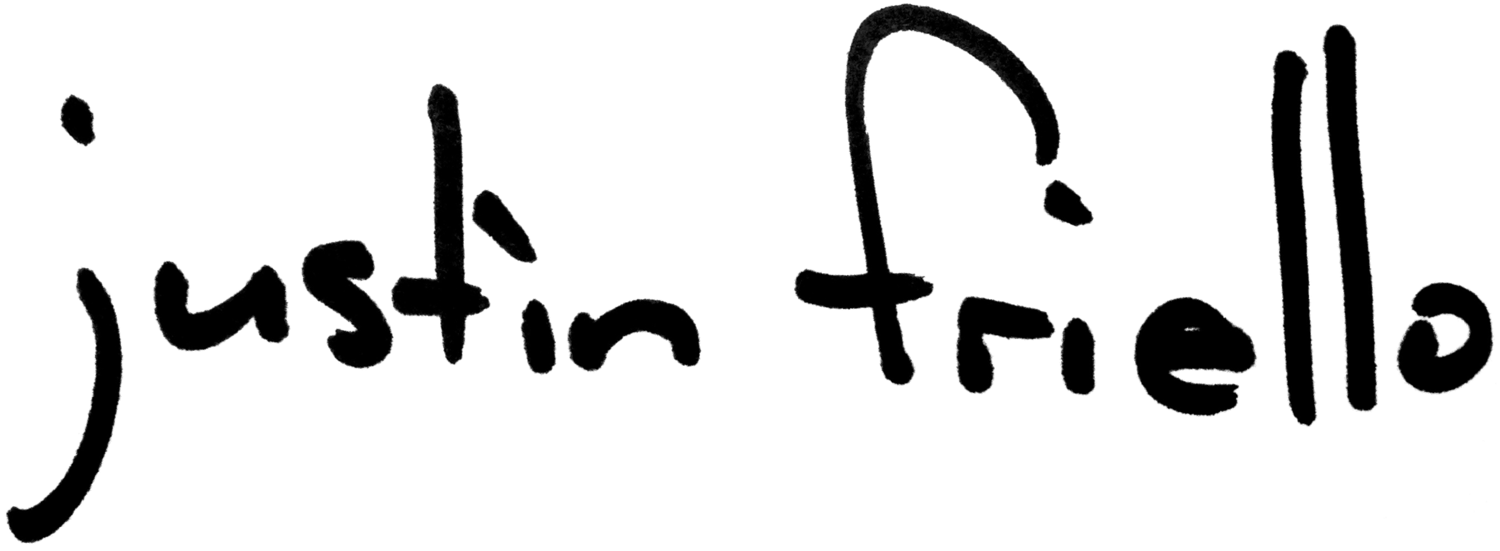
CLASSICAL
Featured Work
to Mitch (2013)
Piano and Voice
text by Justin Friello
Justin Friello, Piano and Voice
Voertman Hall, University of North Texas College of Music
October 27, 2025
I was inspired to write this art song after reading the following exchange from Tennessee Williams’ A Streetcar Named Desire:
MITCH: Let's turn the light on here.
BLANCHE: Light? Which light? What for?
MITCH: This one with the paper thing on it.
[He tears the paper lantern off the light bulb. She utters a frightened gasp.]
BLANCHE: What did you do that for?
MITCH: So I can take a look at you good and plain!
BLANCHE: Of course you don't really mean to be insulting!
MITCH: No, just realistic.
BLANCHE: I don't want realism. I want magic!
fifteen minutes (2025)
4-channel Audio and Live Performer
text by Justin Friello
Justin Friello, Live Performer
Merrill Ellis Intermedia Theater, University of North Texas College of Music
September 22, 2025
"…what we know is not the world, but stories about the world, that no use of language matches reality but that all uses of language are interpretations of reality."
—Stanley Fish, Is There a Text in the Class?
Fifteen Minutes features 4 channels of audio tracks, each its own story or slice of life, spatialized to the 4 corners of the performance space. The live performer tells their own story and must time their performance precisely to fit in between the pre-recorded audio.
for richard serra (2024)
Solo Vibraphone
Patrick Overturf, Vibraphone
Voertman Hall, University of North Texas College of Music
April 25, 2025
Patrick Overturf approached me about writing a solo Vibes piece with speaking for one of his doctoral recitals. I was trying to find a text that matched the kind of instrumental music I was writing at the time, music that involved slowly shifting cells of rhythm and pitch. Not only does Serra’s quote below fit that perfectly, its actual semantic content spoke to my feeling that art does not inherently present meaning, but engages with the audience’s desire to make meaning out of and connect personally to all sorts of experiences, artistic or otherwise.
"I think one of the things art does is it asks you to perceive what it is on its own level. And it can come up and grab you at any time. It can be reassuring. It could be exactly the opposite; it could agitate you; it could be something you dismiss. It could be something that engages you. It could be something you recall. It could be something that leads to things that have nothing to do with what you're looking at. So I think works of art engage, possibly, an internal memory bank that isn't linear, and it can make you see the outside reality in that way also."
—Richard Serra, interview with the San Francisco Museum of Modern Art, 2011
Conexiones Divididas (2024)
Music for the dance by Ilse Mayté
4 cassette players with single-channel audio
Dancers: Trinity Kyelynn, Erin Mylett, Alexy Quiroga, Veronica Ramirez
Musicians: Aidan Barboza, Justin Friello, Jacob Lord, Brittany Padilla
Merrill Ellis Intermedia Theater, University of North Texas College of Music
November 11, 2023
The sounds of Conexiones Divididas are taken from interviews with choreographer Ilse Mayté's friends and family in Mexico and the United States. Justin Friello cut and spliced them into four different compositions (2 in English, 2 in Spanish) before transferring each of them onto their own cassette tapes. The musicians, placed in the four corners of the space, surrounding the dancers, have instructions on how to manipulate the cassette players according to cues in the choreography. The result is a soundscape that reflects Mayté's own divided personal history—living in Mexico, but going to K-12 school and college in Texas—and her split identity, never feeling fully embraced by the people of either country.
off a pane)the (2014)
Two Voices
text by E. E. Cummings
Justin Friello & Morgan Minear, Voice
Merrill Ellis Intermedia Theater, University of North Texas College of Music
November 21, 2025
This is the shortest piece I’ve ever written.
original handwritten score (2014)
who(is?are)who (2024)
Guitar and Oboe
text by Justin Friello
Bokyung Byun, Guitar
Jung Choi, Oboe
Merrill Ellis Intermedia Theatre, University of North Texas College of Music
March 26, 2024
I was inspired to write this piece after reading E. E. Cummings’ poem with the same first time. The interplay between the two characters in the poem was a perfect structural starting point for my composition. I’ve treated the both instruments as soloists and as providers of accompaniment for the other.
Goodnight Nobody (2024)
Orchestra
UNT Concert Orchestra; Ella Castro, conductor
Murchison Performing Arts Center, Winspear Performance Hall
April 26, 2024
My first piece for orchestra. All pitch material in this work is based on the speech melodies of me reading the text of the children’s book, Goodnight Moon by Margaret Wise Brown, to whom the work is dedicated. Orchestrationally, I was heavily influenced by Morton Feldman’s Coptic Light.
A Fine Is A price (2022)
Large Ensemble, Live Mixing, and Pre-recorded Material
DEMO: Live vocals: Justin Friello, Elyse Brown, Alexa Flinker, and Cheryl Russell
A Fine Is A Price was inspired by an episode of the psychology/economics podcast No Stupid Questions in which they discuss a study in behavioral economics about the effects of fines on parents when they arrive late to pick up their kids from daycare. The unexpected result that once parents understood and accepted the small monetary price, they increased this behavior rather than reducing it was a revelatory moment for me. I started to reflect on my own past behaviors in romantic relationships, how I’d seemingly accepted all possible fines—undesirable outcomes—without changing.
The piece uses large chunks of text for the original study plus additional texts from my correspondences as well as personal archival recordings. Not quite an opera, A Fine Is A Break is a collage of heartbreaks and epiphanies.
Click here to view the score.
Click here to read the original study.
The Interrogative mood (2020)
Solo Voice
text by Justin Friello
What feels essentially human to me is our attempts to make sense of things. In this piece, I broke up the text of first ten pages of the eponymous, all-questions novel by Padgett Powell into 24 discreet categories, giving each its own vocal technique. Through aural correlation, the piece draws connections between sections of the text which may have otherwise gone unnoticed. This technique does not attempt to analyze or impose meaning on the text, but rather, strives to make sense of the text’s overall structure.
Click here to view the score.
An Artistic Statement
I am a composer of vocal music. And there are two defining yet opposing characteristics to my work: Logic and Theatre.
If history has taught us anything, it’s that the world is highly unpredictable. When I write music, I’m trying to make sense of this reality where so many things happen without obvious causes. The root of this unpredictability is, of course, the illogicality built into human nature, and that nature is what ultimately leads to the representation of the opposing forces of Logic and Theatre in my work.
I think people are the most interesting things in the universe. Despite all our collective knowledge, we have no real ideas about why we do the things we do. We often do not act in our best interests. We certainly don’t know what we want most of the time. We believe all sorts of things that make us feel good but which only hurt us more. We are the most illogical things. That’s why I try bring a sense of order to all my work: because if life is—if people are—going to be this illogical, my music surely won’t be. I spend an inordinate amount of time doing pre-compositional planning. There are a few systems I return to time and again, but often I am guided to create new systems for each piece based on the texts I’ve chosen to use (including my own) and the human characteristics I’m trying to bring out of these texts. I could talk about what these systems are, but ultimately they’re not important, not to the audience anyway. They’re highly personal and I don’t need them to mean anything to anyone else but me. They are a means to an end, and that end is Theatricality.
Ultimately, my obsession with people and making sense of their wildly fluctuating desires leads me to Theatre. In every sense of the word, my work is theatrical. Sometimes that means literal theatre: musicals, scores for stage plays, or opera. Other times it’s an art song or monodrama or a whole singer/songwriter album. What these different media have in common is the reliance on the conveyance of human emotions. That’s why I write for Voice. It’s the drama, the human impulse, the necessity that people have to express themselves in which I am interested and included. The full range of human emotion, the endless set of possibilities for who a person can be: I want to put that on stage, no matter the method of presentation. I want people to really feel like themselves, feel like they’re really human when they hear my work, however cacophonous or abstract or simple or overwhelming or it may be.
Every note is written in service of that goal. That’s why every piece is so different. Because each person is so different. Each piece is a different person. When you look at my work, I hope you see not a composer who can’t decide what he wants to sound like, but rather a composer who knows exactly what he’s doing and has fully embraced a polystylistic creative practice in order to achieve a singular objective in every one of his works. All the elaborate pre-compositional systems, the incredibly specific performance notes, and the wrangling of indeterminate materials into highly concrete forms; all that mixed with the dichotomy of allowing performers to make sweeping interpretations and to have fun with serious music and my regular abandonment of enforcing my own preferences in performance: these are the byproducts of taking all of humankind’s illogicality and earnestness and ecstasies and silliness and terrors and hopes and loves and losses and sublimating them into something more orderly and beautiful for you to listen to and hopefully—for however long the piece lasts—making you marvel at the fact that we’re alive.
CURRICULUM VITAE
Click here.







